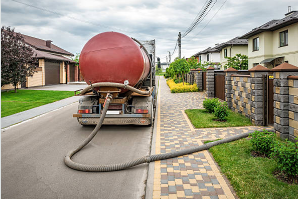What Is Septic Tank Pumping?
A septic tank is an underground chamber that treats household wastewater. Wastewater from bathrooms, kitchens, and laundry enters the tank, where solids settle to form sludge and oils/greases float to form scum. The remaining liquid effluent is safely discharged into a drain field.
Over time, the sludge and scum accumulate. If not removed, this buildup can overflow into your pipes, leading to clogs, sewage backups, and even system failure.
Septic tank pumping involves using specialized equipment to safely remove this sludge and scum. Professional services ensure that the tank is cleaned thoroughly, preventing contamination and extending the system’s lifespan.
Key takeaway: Regular pumping is not just maintenance—it’s essential for your home’s safety and long-term system performance.

Why Septic Tank Pumping Is Critical for Your Home
Maintaining a healthy septic system is crucial for both safety and convenience. Here’s why:
1. Prevent Costly Repairs and Emergencies
A neglected septic tank can cause sewage backups into your home—a messy, expensive problem. According to the Environmental Protection Agency (EPA), the cost of repairing a failed septic system can range from $3,000 to $7,000, far exceeding the cost of routine pumping, which typically ranges from $250–$600 per visit depending on tank size and location.
By scheduling regular septic tank pumping services, you prevent sludge from building up, avoiding emergency repairs and protecting your property.
2. Protect Health and the Environment
A full or leaking septic tank can contaminate groundwater with bacteria, viruses, and chemicals, posing serious health risks. Symptoms of exposure can include nausea, diarrhea, and skin irritation.
Professional pumping ensures waste is safely removed and disposed of according to regulations, minimizing the risk of contamination and environmental damage. This is particularly important in areas with high water tables or sensitive ecosystems.
3. Extend the Life of Your Septic System
A well-maintained septic tank can last 20–30 years. Failing to pump regularly accelerates wear and tear, damages pipes, and reduces system efficiency. Routine pumping is the simplest way to protect your investment and avoid costly replacements.
How Septic Tank Pumping Works
Professional septic tank pumping is more than just removing waste. Here’s the process:
- Inspection: Technicians inspect the tank and system to check sludge levels, scum buildup, and signs of damage.
- Pumping: A vacuum truck removes sludge and scum safely, leaving the tank clean.
- Cleaning & Maintenance Check: The tank and inlet/outlet pipes are inspected for cracks or blockages.
- Documentation: Many providers give a maintenance record for future reference, helping track the system’s health over time.
Tip: Avoid flushing non-biodegradable items, grease, or chemicals, as these accelerate sludge buildup and can lead to clogs.
Signs Your Septic Tank Needs Pumping
Even if you don’t have a schedule, your system will give warning signs:
- Slow Drains: Water takes longer to drain in sinks, showers, or toilets.
- Gurgling Sounds: Noises in plumbing can indicate trapped air or sludge buildup.
- Sewage Odors: Bad smells around the tank or yard are a clear warning.
- Standing Water or Muddy Areas: Indicate possible leakage or drain field issues.
- Lush Grass Above the Tank: Sometimes overly green grass signals wastewater surfacing.
Ignoring these signs can lead to system failure, costly repairs, and environmental hazards.
How Often Should You Schedule Septic Tank Pumping?
The recommended frequency depends on several factors:
- Household Size: Larger households produce more wastewater, filling tanks faster.
- Tank Size: Standard tanks (1,000–1,500 gallons) may require pumping every 3–5 years.
- Water Usage: High water consumption, garbage disposals, and heavy laundry increase sludge accumulation.
- System Type: Advanced or aerobic septic systems may have different maintenance needs.
Pro tip: A professional inspection before pumping helps determine the exact frequency for your system.
DIY vs. Professional Septic Tank Pumping
While some homeowners may consider DIY options, the risks often outweigh the savings:
Risks of DIY Pumping:
- Exposure to harmful bacteria and gases
- Incomplete sludge removal
- Potential damage to pipes or tank
- Improper waste disposal, which may violate local regulations
Advantages of Professional Services:
- Certified technicians with proper safety training
- Specialized equipment for complete tank cleaning
- Compliance with environmental regulations
- Inspections to detect potential problems early
Hiring a professional ensures your septic system is safe, efficient, and long-lasting.
Tips for Choosing the Right Septic Tank Pumping Service
Selecting the right provider is key to maintaining your system. Look for:
- Licensing and Certification: Verify that the company is authorized to handle septic systems.
- Experience: Companies with years of experience are more likely to identify and prevent potential problems.
- Equipment: Modern vacuum trucks and pumps ensure thorough cleaning.
- References & Reviews: Check online reviews or ask for customer references.
- Environmental Responsibility: Ensure the company disposes of waste according to local laws.
Bonus Tip: Ask if the company provides a maintenance schedule or reminders, which makes long-term care easier.
Common Myths About Septic Tank Pumping
Myth 1: “I don’t need pumping if I haven’t noticed any problems.”
- Truth: Sludge can accumulate silently, causing major damage before you notice.
Myth 2: “Pump it myself to save money.”
- Truth: DIY pumping is risky and often incomplete. Professionals prevent system failure.
Myth 3: “Septic tanks last forever.”
- Truth: With regular pumping and maintenance, tanks last decades—but neglect shortens their lifespan.
Conclusion: Protect Your Home with Professional Septic Tank Pumping Services
Regular maintenance through professional septic tank pumping services is not optional—it’s essential. By preventing blockages, protecting health, avoiding costly repairs, and extending system life, you secure your home’s safety and efficiency.
Schedule routine pumping today to avoid emergencies and ensure your septic system continues to function properly for years to come. Your home, family, and the environment will thank you.

